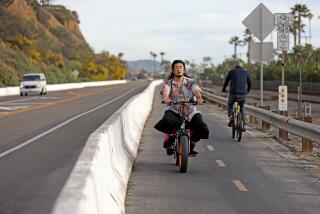Copenhagen Battles Bicycle Thefts by Offering 5,000 Bikes for Free Use Around City
- Share via
COPENHAGEN, Denmark — Officials in the Danish capital believe they have found a way to stop bicycle thefts--let people use them for free.
Starting in May, 5,000 bicycles carrying advertising from sponsors will be placed in 900 bike racks throughout Copenhagen.
They’ll be available for use by anyone who needs them, tourists, shoppers, businessmen late for an appointment or commuters who have missed the bus.
“You take a bike, drive around as long as you want it and put it back in a special-built rack. No charge,” explained Ole Wessung, a 30-year-old chiropractor and an originator of the Bycykel (City Bike) project.
“I had enough of getting my bicycles stolen. Five of them have disappeared within three months,” he said.
According to police, 101,288 bicycles were reported stolen in 1989 in Denmark, a loss of $1.74 million.
Wessung and publisher Morten Sadolin, 30, spent two years developing the project, and hope to make money by selling the advertising space on the bicycles.
The Copenhagen City Council--interested in reducing air pollution, traffic congestion and bike thefts--has given permission for placement of the bicycle racks on almost every other street corner.
A similar plan was proposed for Amsterdam in the 1970s but never caught on in the Dutch city. However, a similar free-bike plan is operating successfully at the Hoge Veluwe national park in the Netherlands. In the closed-off area, visitors can pick up a bike for free and drop it off anywhere else on the grounds.
Eight companies have put up the first $1.7 million to get the Copenhagen project going.
“They sign a three-year contract and during that period bicycles with their brands and colors will be seen in the streets,” said Wessung.
The clumsy-looking bicycles have big, flat central tubes where sponsors’ advertisements will be placed. But the ungraceful appearance also has another purpose.
“They are easily recognizable and were designed so no one would steal them,” said Wessung. “Everyone can see it’s a Bycykel. If you are spotted 200 kilometers (125 miles) away from Copenhagen, you’re either a good rider or a thief.”
Would-be thieves are discouraged from stealing the bike for refitting because standard saddles, wheels and other parts do not fit the Bycykel, which means “city bike” in Danish.
Wessung said the bikes are easily maneuverable, but are not multispeed.
They can be obtained in the way travelers get luggage carts at international airports.
Users insert a coin worth $3.50 in a slot on the bike, and are then able to unlock it from the stand. A coin of the same value is returned when the bike is relocked into another rack.
Wessung and Sadolin plan to test their Bycykel next year in Paris and Rome, where authorities are trying to discourage use of cars in the city centers.
“We hope businessmen, tourists and everyone will borrow our bicycles to get around in Copenhagen. People are screaming about pollution and the Copenhagen municipality wants a car-free city,” Wessung said.
More to Read
Sign up for Essential California
The most important California stories and recommendations in your inbox every morning.
You may occasionally receive promotional content from the Los Angeles Times.













